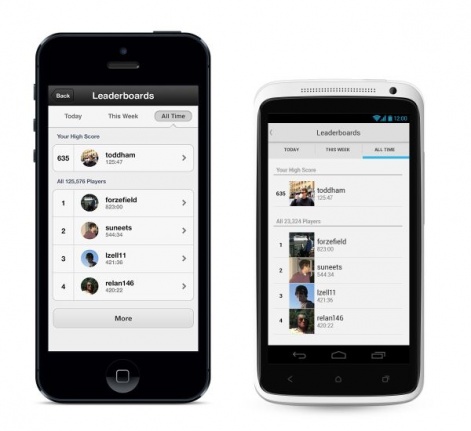But it's also an evolution of the OpenFeint offering. Peter Relan was a co-founder of both OpenFeint and OpenKit, and he told us that the former was essentially envisioned as an "Xbox Live for iPhone."
OpenKit offers similar functionality, but with a host of other features designed for what Relan sees as the cross-platform, mutli-device world we live in now.
Now following a private beta phase, Relan is set to unveil version 1.0 of OpenKit at GDC 2013, where he and the company co-founders plan to make themselves available to any developers in attendance.
Ahead of that unveiling, we caught up with Relan to find out more.
Pocket Gamer: What can you tell us about OpenKit version 1.0?
Peter Relan: What we're doing with the first version of OpenKit 1.0 is since it's an open source project we're making it very much a community-driven effort.
So we had over a thousand developers sign up with us in the last couple of months and the majority of them have asked for cross-platform support for cloud services and specifically cloud services for their cross-platform Unity games.
So we had already said we are going to do cloud sync of game state because we live in a multi-device world now, right?
People have an Android phone and an iOS tablet or vice versa, and they really wanted to be able to support things across these heterogeneous devices. So we were already supporting game save in the cloud and the leaderboards that was our plan anyway.
But now very specifically, they've asked for Unity plug-ins for those features. So version 1.0 is essentially a cloud game services solution for Unity. That's really the primary ask in the development community.
And we think that's heavily influenced by the fact that Unity is very popular as a cross-platform game engine and cross-platform is very important this year. Android has picked up tremendously in the game development community's mind.
So that's the lead feature. The second thing is that even without the Unity plug-in, we are offering these features.
And the former head of OpenFeint sales engineering the person who was helping developers with their integrations Joe Sandmeyer, contacted us. He has a company called KitBoost, which is specifically going to partner with OpenKit and offer migration services for ex-OpenFeint customers.
Because, like I said, we have two flavours of OpenFeint software, one of which will be specifically Unity. More than 50 percent of our developers have asked for good integration with Unity, so that's the lead feature.
And then, we think there are a lot of other developers out there, so, we have a partner now who will help people who never migrated off of OpenFeint they never went to GREE, they never did anything to migrate to Openkit.
What are the similarities and differences between OpenFeint and OpenKit both in terms of featuresets and the thinking behind them?
I think OpenFeint was really predicated on the rise of the iPhone. Originally it was very much an Xbox Live for the iPhone you know, leaderboards and achievements. That was the philosophy.
I think today, the world has changed. What are the differences? Well, people still want cloud-based services like OpenFeint that remains the same but the context has changed.
One: much more cross-platform. Today, if it was an iOS-only world, Game Center is out there, and people would say "it's interesting to have something that's open-source, but I've got what I need on Game Center"
But we find that people, even iOS developers, are not happy with that, because it's truly a cross-platform world, and there isn't a common cloud-service between iOS and Android. It's just non-existent.
So unless you're an iOS-only developer, which was less than 25 percent when we surveyed our developers, you're basically not in a very good position to use Game Center.
So that's a big difference. It's a fundamentally cross-platform world. Therefore, Game Center is not sufficient. Also, Android has nothing on this front, and there's nothing coming from Google.
So it was a welcome relief to say, ah finally, a cross-platform cloud-gaming service. Everyone thought that was just right-on. Just like Xbox Live for the iPhone was right-on for its time, cross-platform cloud gaming service is right-on for its time.

OpenKit in action.
The second point is, when the iPhone took off, we added Unity support to maybe version two-point-something of OpenFeint. Whereas today, on day one, more than half of our developers are using the Unity game engine. So automatically, we're going out the gat with unity plug-ins.
And that's been a fair amount of work to make it work flawlessly with Unity. So that's a big difference.
Any why are people using Unity? Because it's a good cross-platform engine. So one could argue that the popularity of Unity today is itself tied to cross-platform. So it may be really the first point again.
And then the other big difference is, the most popular feature requests for OpenFeint when we rolled it out were leaderboards and achievements. This time, we asked our developers what they wanted, and the most popular request by far was cloud synchronisation of game states.
Again, I think that may be somewhat to do with cross-platyform, but also multi-device. Everyone has a tablet and a phone or will have this year. What developer is not targeting a phone and tablet app? So I do think that's why cloud game sync is such a big deal to these guys.
So these are the differences in today's environment. Cross-platform is fundamental, and multi-device is fundamental philosophically to us. And the third one of course is open source. That was our vision and philosophy from day one, always.
You mentioned that other cross-platform cloud services solutions are 'non-existent', but what about the likes of Corona Cloud?
Yes, of course, but what I'm trying to refer to is: by definition, when you say Corona Cloud, Corona is a certain framework.
Despite the fact that Corona Cloud can be used independently of the Corona SDK, I think the perception in the developer community does not seem to be that.
What matters is what developers think. And what developers think is: they've got Game Center, which is game engine-independent, or they can use Corona Cloud which is game engine-dependent.
When OpenFeint was built, there was Scoreloop and Agon and there were four or five other things. But the perception mattered the perception that here's a company that's committed to serving the developer base.
So I don't think that these are widely-understood concepts that you can take Corona Cloud or similar, and use it independently of the Corona SDK. These are subtleties that possibly a lot of people don't understand.
One of the key features of OpenKit is that it allows developers to handle and host their own data. Why do you think developers want to do that? It seems like it might be a hassle for some.
Well, it would be a hassle. The philosophy was that you want the comfort and safety of knowing that you can get to your data, but the whole point of OpenKit is our business model is based like GitHub on saying, anytime you feel locked in, you can take your data.
And the GREE thing you'll never have that happen again, no matter what happens to OpenKit.
But our business model is predicated on most small developers would pay a monthly subscription for us to run the service and host it.
I felt a little bad about the thousands of developers that were affected by the shutdown of OpenFeint. It all looked good for a while. GREE, this bigger company, was going to adopt OpenFeint and then make it pervasive.
But when they shut it down, there were a lot of developers who called me and said "what the heck? Now we have to go to GREE they've got our data."
So I think the comfort of knowing that our company philosophy and mission is any day you want, whatever happens to OpenKit in the future, you are free to take your data with you. You'll never have this problem again.
It's insurance. You don't buy insurance hoping to get into a car accident [laughs].
How will pricing work?
It will be very simple. It's free to a certain point. Obviously to run servers and to serve up game states and leaderboards will cost us money.
So you can adopt the SDK for free, but beyond a certain consumption of the service, there will be a monthly subscription. So if your game is in beta test mode, for instance, and it's hardly using anything, it won't cost you anything.
But we don't want some indie hit to really become big and huge and tax our servers with millions of users if we're paying for that. It's a freemium model, where there's a monthly subscription to host the service, and we'll reveal the details to developers when we go into public beta in April.
Right now we're in private beta, and we're very focused on functionality. We've got 50 developers working with us a very large private beta. Even OpenFeint, if I remember correctly, had only 12 developers in its private beta,
What will your presence at GDC be this year?
Fantastic. The deck founders will be at GDC all week.
The idea is, anytime you're walking around, you can contact them via email and set up a time to meet with them. They'll sit down with you over a cup of coffee and go over how to integrate and all that stuff.
Also, we have a boat in the bay for a day! So we're hosting developers to come over and hang out with us and learn more about OpenKit. We'll have laptops and everything on a boat for the whole day. I think that's on Tuesday.
So we're hosting a hands-on development sessions on a boat in the San Francisco bay [laughs].
But of course, any time during the GDC week, any developer can contact us on the website and say "hey I'd love to meet you, are you available at this time?" And there are three co-founders, so one of them will make themselves available.
We want to meet with hundreds of developers if we can.
Thanks Peter. Any parting thoughts?
My belief is that this will be bigger than OpenFeint. I think the need and the pain is even greater today than it was then.
This whole cross-platform thing is massive. Cloud game sync you just can't live without it. Users will not tolerate your game not having these capabilities.
It's a multi-device cross-platform world, so you need it. There's no way around it.
Thanks to Peter for his time.























